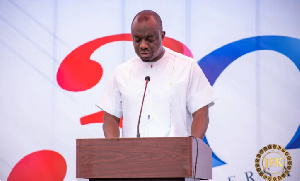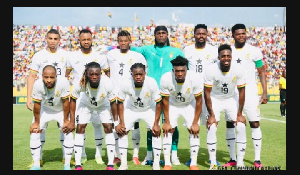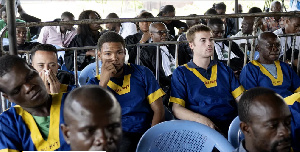BBC Pidgin of Monday, 16 August 2021
Source: BBC
Taliban Afghanistan war: Wetin cause di fight-fight for di South Asia kontri?
Afta 20 years of war, foreign forces don pull out of Afghanistan sake of one deal between di US and di Taliban militants wey dem comot from power back in 2001.
Di conflict don kill tens of thousands of pipo and displace millions.
Di Taliban don pledge say dem no go allow Afghanistan to become a base for terrorists wey fit threaten di West.
But di kontri former rulers wey bin tough don gain entry for recent weeks pass Afghan army soldiers, wey dem leave to protect di weak goment.
Di Taliban also make a pledge for national peace tok, but many dey fear a worse civil war wey fit happen.
Nevertheless, Joe Biden, di fourth US president to oversee wetin don become America longest-ever war - war wey don cost hundreds of billions of dollars - don set a symbolic date of 11 September 2021 for full withdrawal.
Why US fight war for Afghanistan and why e last so long?
Back for 2001, di US dey respond to di 9/11 attack on New York and Washington wia nearly 3,000 pipo die. Officials identify Islamist militant group al-Qaeda, and dia leader Osama Bin Laden, as pipo wey dey responsible for di attack.
Bin Laden bin dey Afghanistan, under di protection of di Taliban, di Islamists wey don dey power since 1996.
Wen dem refuse to hand am over, di US intervene wit military and quickly remove di Taliban and vow to support democracy and eliminate di terrorist threat.
Di militants escape and later regroup.
Nato allies bin join di US and new Afghan goment take over for 2004 but deadly Taliban attack continue. President Barack Obama "troop surge" for 2009 help push back di Taliban but no be for a long time.
For 2014, at di end of wetin be di bloodiest year since 2001, Nato international forces end dia combat mission, leaving responsibility for security to di Afghan army.
Dat one give di Taliban strength and dem seize more territory.
Peace toks between di US and di Taliban start small-small, wit di Afghan goment wey no too dey involved, and di agreement say US go withdraw come for February 2020 for Qatar.
Di US-Taliban deal no stop di Taliban attacks - dem switch dia focus instead to Afghan security forces and civilians, and target assassinations. Na so dia areas of control grow.
Who be di Taliban?
Dem emerge from di civil war wey follow di withdrawal of Soviet troops for 1989, predominantly for di south-west and di Pakistan border areas.
Dem vow to fight corruption and improve security, but also follow some strange part of Islam.
By 1998, dem don take control of almost all of di kontri.
Dem enforce dia own hardline version of Sharia, or Islamic law, and introduce strong punishments. Dem make men to grow beards and women to wear burka wey cover dem from head to toe. TV, music and cinema bin dey banned.
Afta dia overthrow dem regroup for Pakistani border areas.
With up to 85,000 full-time fighters, tori be say dem dey stronger now dan at any point since 2001.
How costly di war don be?
In terms of lives wey don lost, e dey no dey easy to say exactly. Di number of coalition casualties na wetin dem record better dan Taliban and Afghan civilians.
Research by Brown University estimate losses for di Afghan security forces say e dey at 69,000. E put di number of civilians and militants wey dem kill at about 51,000 each.
More dan 3,500 coalition soldiers don die since 2001 - about two-thirds of dem na Americans. More dan 20,000 US soldiers wunjure.
According to di UN, Afghanistan get di third-largest displaced population for di world.
Since 2012, some five million people don run comot and dem no fit return home, either dem dey displaced within Afghanistan or dem dey take refuge for neighbouring kontris.
Brown University research also put di US spending on di conflict - including military and reconstruction funds for both Afghanistan and Pakistan - at $978bn (£706bn) up to 2020.
Wetin fit happen next?
Di obvious question na, Taliban go take over di kontri again?
President Biden don express confidence say di militants no go overthrwo di goment for Kabul.
But one US intelligence assessment for June conclude say Kabul fit fall within six months of di military departure.
By early August di Taliban dey in control of about half of di kontri, according to research by di BBC and odas.
By di middle of August, dem reach di capital Kabul.
Di US bin say dem go keep 650 to 1,000 troops to guard di US embassy, Kabul airport, and oda key goment installations. Di Taliban say dem fit target any remaining troops.
Di oda major fear na say once again di kontri go become a training ground for terrorism.
Taliban officials insist say dem go fully follow di deal and prevent any group from using Afghan soil as a base for attacks against di US and dia allies.
Dem say dia aim na only to implement "Islamic goment" and say dem no go pose any threat to any oda kontri.
But many analysts say nothing fit separate di Taliban and al-Qaeda, wit al-Qaeda fighters heavily involved and engaged for training activity.
E dey important also to remember say di Taliban no get centralised and unified force. Some leaders fit want to keep di West silent by not starting trouble but di extreme ones fit no want to break links to al-Qaeda.
Just how powerful al-Qaeda dey and whether dem fit rebuild dia global network also dey unclear.
Den e get di regional branch of di Islamic State group - ISKP (Khorasan Province) - wey di Taliban oppose.
Like al-Qaeda, ISKP don dey degraded by di US and Nato but dem fit use di post-withdrawal period to regroup.














